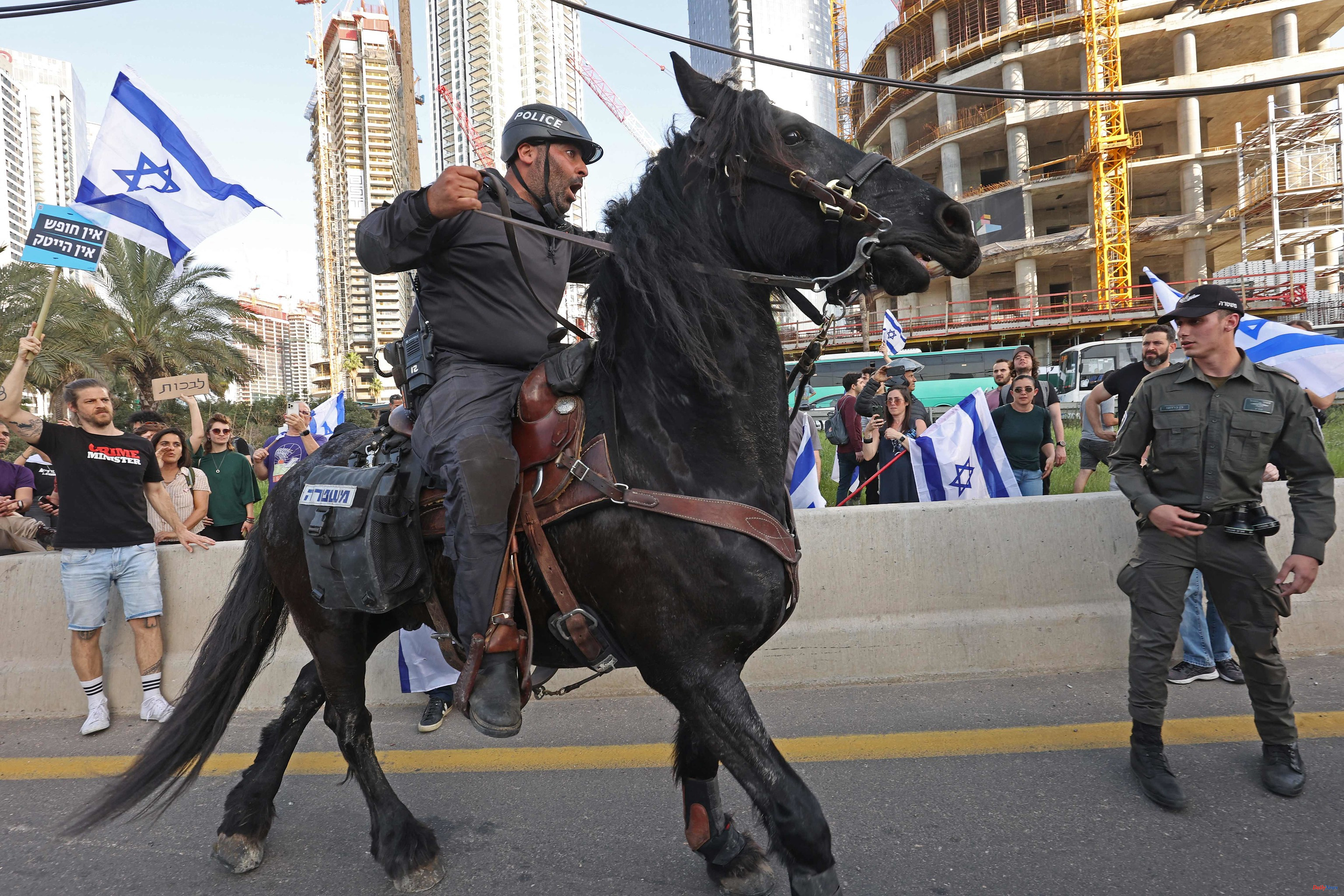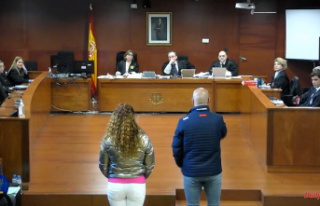Demonstrations, roadblocks, flag marches, shouts in front of the houses of leaders, clashes, 11 injured and 40 detainees have marked the most intense day of protests in Israel against the government's proposed laws to significantly weaken the power of the judiciary and especially the Supreme Court (TS).
While Tel Aviv was the unusual scene of violent clashes between protesters and police this Wednesday, the Knesset in Jerusalem witnessed the usual harsh rhetorical clash between the ultra-conservative coalition led by Benjamin Netanyahu and the opposition led by former Prime Minister Yair Lapid around the legislative initiative that, although it is far from being completed, already causes damage to the Israeli economy beyond deepening internal polarization.
The area between the Azrieli shopping center and intersection and Via Ayalon in the main southern access to Tel Aviv became this Wednesday not only the epicenter of the popular protest as in the last eight Saturdays but for the first time in a field of battle with the road blockade by the protesters and the police use of riot control measures such as stun grenades, the cavalry unit and on several occasions water cannons.
"The demonstration is a basic right of democracy that we guarantee but what we cannot tolerate is the throwing of stones at the police. We do not allow anyone to block traffic and block the Ayalon road," said police spokesman Shlomi Sagui, while the Minister of National Security, Itamar Ben Gvir, presumed that he gave orders "to not allow anarchist attacks against the agents or roadblocks."
Among the protesters was former Prime Minister Ehud Olmert, who blamed Ben Gvir: "The problem with the police is that they received orders from an extremist vandal and a terrorist who is the one in charge in the country. This government will fall much sooner than expected."
"Netanyahu hopes that this reform will help him in the corruption trial. I am afraid that his plan will end judicial independence and democracy. That is why we are demonstrating," Ariela told EL MUNDO in Tel Aviv.
From the Knesset, Netanyahu declared that "the police must act to guarantee law and order in the face of demonstrations, whether from the right or the left" and pointed to his rival: "Instead of accepting our proposals for dialogue, Lapid wants there to be anarchy and an institutional and constitutional crisis through which new elections are called".
Lapid denounced that Netanyahu fomented anarchy by avoiding the appointment of Ben Gvir and left the Knesset to arrive at the demonstration in Tel Aviv. "We came here because if there is a fight between the government and the people of Israel, we are on the side of the people of Israel." The leader of the second opposition party, Benny Gantz, spoke by phone with Netanyahu to ask him to stop the initiative and start a dialogue. "My door is open," he replied to Gantz. Not so the demonstrators who protested at his residence in Jerusalem.
With just a few days in office, the Minister of Justice, Yariv Levin, announced his plan at the beginning of January, which for example includes that the coalition have a majority to appoint judges -not like now that an agreement is required between politicians, judges and lawyers- and that the Supreme Court cannot annul laws. Since then, there have been massive demonstrations in the streets and dozens of manifestos signed by influential social, economic, commercial, political and cultural sectors of the country. According to polls, the majority of Israelis oppose the weakening of the judiciary and call for dialogue to agree on a reform.
The protest, the largest and most transversal in Israel since the streets were filled in 2011 against the high cost of life, ranges from schoolchildren to former heads of government, including judges, lawyers, politicians, economists, businessmen, entrepreneurs, teachers, doctors, actors, former diplomats, reservists (who warn that if the reform is approved they will no longer report to service) and former senior officials of the Army and the Mossad (their workers, except high-ranking ones, received the green light to be able to demonstrate if they wish) . All of them warn that "if all the legal coup laws are approved, Israel will no longer have a separation of powers and therefore it will no longer be a democracy and will be more like Hungary or Turkey."
Even one of the greatest footballers in Israeli history, Eyal Berkovic started his popular TV show last Friday on Channel 12 with a minute of silence. Armed with an Israeli flag, he justified his protest against what he called a "corrupt and radical government." "This is a memory and a tribute to democracy," he said.
Levin maintains that "the reform corrects the historic mistake made in the 90s that gave excessive power to the Supreme Court to the detriment of the leaders elected at the polls." The Minister of Justice adds that he is willing to talk but refuses to stop "not even a minute" his process in Parliament.
This Wednesday, the law establishing that the prime minister can only be declared incapacitated for physical or mental reasons and with the vote of 90 deputies was approved in preliminary reading. This is a Likud resource to prevent the judiciary from declaring Netanyahu incapable of continuing in office for violating the agreement not to deal with judicial matters taking into account his trial for corruption.
Another bill approved this Wednesday in preliminary reading establishes the possibility of sentencing terrorists with the death penalty, as promised by Ben Gvir in the elections on November 1 in the face of the wave of Palestinian attacks. It is not the first time that this bill has been approved in the preliminary round, so there are many doubts that it will be completed in the three additional votes required. In addition, the two ultra-Orthodox parties in the coalition oppose the law and Netanyahu although he gave the green light today but in the past he has opposed it and will surely block it as according to security agencies it does not serve as a deterrent and is counterproductive.
The protest in Tel Aviv moved to Jerusalem at the end of a day that aggravates the enormous crisis in a country that on the other hand faces the worst escalation with the Palestinians in recent years.
According to the criteria of The Trust Project












